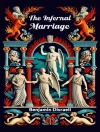In Victor Hugo’s ‘Ninety-Three, ‘ the turbulent backdrop of the French Revolution serves as the crucible for a profound exploration of human nature and the moral struggles inherent in revolutionary zeal. Set against the violent chaos of 1793, Hughes employs a vivid and romantic literary style, weaving together themes of loyalty, justice, and the tumult of political ideals. Through compelling character arcs—including the noble hero and the conflicted antagonist—Hugo captures the intensity of revolutionary fervor while simultaneously questioning the ethics of violence in the pursuit of liberty, reflecting a literary context that grapples with the consequences of unfettered ambition. Victor Hugo, a foundational figure of French Romantic literature, was deeply engaged with the social and political issues of his time, which undoubtedly influenced his creation of ‘Ninety-Three.’ His poignant experiences—growing up amid social upheaval and witnessing the plight of the oppressed—shaped his passionate advocacy for justice and human rights. Hugo’s experiences in exile and his encounters with revolutionary thought inform this gripping narrative, as he wrestles with the dichotomy of noble causes and the often brutal realities they entail. This meticulously crafted novel is a profound commentary on the perils of extremism and the complexities of human loyalty. For readers interested in the intersections of history, philosophy, and literature, ‘Ninety-Three’ is an essential read that not only captivates through its dramatic storytelling but also invites reflection on the moral complexities of revolutionary change.
เกี่ยวกับผู้แต่ง
Victor Hugo, an illustrious figure of the nineteenth century, was born on February 26, 1802, in Besançon, France. He remains a towering presence in French literature, best known for his novels, ‘Les Misérables’ and ‘The Hunchback of Notre-Dame’. His lesser-known work ‘Ninety-Three’ (‘Quatrevingt-treize’), published in 1874, deals with the tumultuous Year II of the French Republic, capturing the revolutionary fervor and the human complexities of the period. Hugo’s literary style is characterized by its richly descriptive language and profound psychological depth. His writing often delved into social and moral issues, earning him a reputation as both a romantic and a social critic. His works transcended the temporal confines of his life, as he believed in the eternal nature of art. Today, Hugo is celebrated not only for his literary achievements but also for his political activism. He was an ardent supporter of republicanism and fought against social injustices and the death penalty. After a life marked by personal loss, political strife, and literary triumphs, Victor Hugo passed away on May 22, 1885, in Paris. His legacy endures, inspiring generations of readers and writers with his passionate commitment to human rights, his artistic brilliance, and his unyielding belief in the power of the written word to usher in change.












